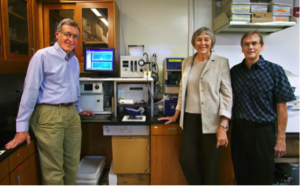
LBNL researchers developed a more accurate way to test cholesterol and evaluate heart disease risk. The test is now available to the public through Quest Diagnostics.
An estimated eighty percent of people with coronary artery disease have cholesterol levels that fall within normal ranges. This suggests that standard cholesterol tests established over fifty years ago do not adequately identify a significant number of people at risk for heart attacks — people who, if alerted, could take lifestyle and treatment steps to reduce their risk.
Lawrence Berkeley National Laboratory (LBNL) scientists discovered a link between heart disease and the relative distribution of subclasses of cholesterol (HDL, LDL, IDL, and VLDL). They invented a gradient gel electrophoresis test to measure various cholesterol subclasses as well as ion mobility analysis to measure the size distribution and count of individual particles. This discovery enabled doctors to distinguish higher risk patients based on lipoprotein size distribution spectra.
A startup, Berkeley HeartLab, was founded on the LBNL technology. Berkeley HeartLab merged with Celera Corporation, which was acquired by Quest Diagnostics in 2011. Starting in 2009, Quest Diagnostics advanced widespread adoption of a specialized cholesterol test, called Cardio IQ – Lipid Subfractionation by Ion Mobility, based on the original LBNL invention.